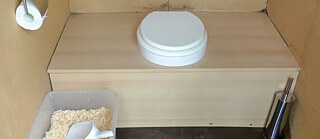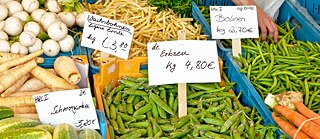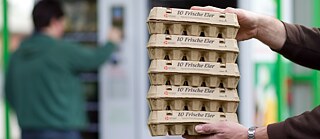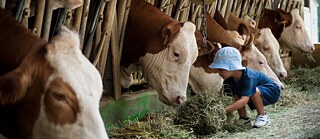City and Country
Home Is Where Your WiFi Is

You read and hear in the media at regular intervals that people are either moving to the country or moving away from it. What is really going on? Is it an urban or a rural exodus? Where are Germans going?
If you follow the media on the subject of urban and rural life, you might think that the reports are full of contradictions. In 2019 a study by the Institut der deutschen Wirtschaft (Cologne Institute for Economic Research) concluded that more and more Germans are actually moving out of the city. A year later, the Dresden branch of the Ifo research institute announced that the proportion of the population living in rural areas had reached its lowest level since 1871. So contradictory! How can that be? Are more people now moving to the country or to the city?
A Rural Exodus of the Younger Generation
Leipzig, Frankfurt am Main and Berlin are the major German cities that recorded particularly high growth in 2018 according to the German Federal Statistical Office. No wonder really, as the infrastructure of a big city in terms of mobility, schools, childcare, administration and medical care makes living there particularly attractive. For example, figures from the BMI (Federal Ministry of the Interior) show that there are 77 to 103 general practitioners for every 100,000 inhabitants in the city-states of Berlin, Hamburg and Bremen and in other independent urban centres. In contrast, in some sparsely populated rural districts in Mecklenburg-Western Pomerania, Brandenburg, Bavaria and Lower Saxony, the figure is only 17 to 44. Young adults between 18 and 30 in particular are moving to the big cities. According to the RWI Leibniz Institut (economic research institute), they make up the largest proportion of all internal migrants at 43 percent.
On the other hand – the housing shortage is also driving people out of the city. In the Berlin district of Kreuzberg, for example, the basic rent for a one-room studio apartment with 25 square meters of living space is 1,000 euros – a price hardly anyone can afford. The reason for this – many apartments are snapped up by real estate investors and the only people living in good locations are often only Airbnb guests. Somehow it is only understandable that people might hit upon the idea that life must be better out in the country, where the air is clean and the space is endless. A farmhouse converted into a contemporary energy-saving marvel, inside a multimedia home office, fresh apple pie on the table and the children, yes, they can finally romp and frolic outside to their heart’s content. At least that is the dream some people have.
Country Life? So Behind the Times!
But as romantic as the idea of country life is, it is sometimes also deceptive. Take the matter of working from home – on the one hand, there is still a lack of fast internet in many rural areas. While the proportion of households in Berlin, Munich and Hamburg with broadband connections is over 90 percent, the rate in many rural regions is below 60 percent. Let us not forget, digital infrastructure is a basic requirement for employees to be able to work from home. For those who cannot work from home, moving to the countryside often means excessive travelling times. In 2018, around 19 million people commuted in Germany, and for almost 60 percent of employees their home and their place of work are in different municipalities. For lower real estate prices you usually have to accept commuting times of an hour or more. This shows – from an ecological point of view, rural life is not an advantage, either. On the contrary – it even causes more carbon dioxide when people live spread out over larger areas, leads to more sealing of soils and higher energy consumption for electricity and heating.
The result – most rural regions are also losing residents. And it has been like this for many years – the further away from a big city people live, the more they want to leave the country. “Young people in particular avoid the country. As a result, there is a lack of skilled workers and births,” says Felix Rösel, head of the Dresden Ifo study. In other words, the rural population is ageing. The death rates in rural areas are sometimes so high that a significant number of younger people moving there would be needed to compensate for the departure of the old. In the Bautzen district, for example, between 2008 and 2015, almost a quarter of the residents between the ages of 18 and 29 migrated. Pubs and restaurants, small grocery stores, butchers and bakeries also disappeared with them.
An Urban Exodus of Families
So where do those people go who have had enough of high property prices, air pollution and the cramped confinement of urban life? According to the German Federal Statistical Office, it is mainly families who are turning their backs on the big city more and more. However, adults between 30 and 49 years of age and their minor-aged children are not actually moving to the countryside, but mainly to the less urbanised surrounding areas of the cities. Studies by the BMI show that population growth in Germany is currently concentrated in the areas around large cities and prosperous rural regions. When the talk is of the federal capital, this phenomenon is known as the “Berlin Drain” – families move to small and medium-sized towns in the Brandenburg area, the so-called metropolitan area. The researchers of the Dresden Ifo study therefore see an increasing concentration of the population, but only in a few places. “During the entire post-war period, Germany’s population has never been so unevenly distributed as it is today,” says the director of the study, Felix Rösel.
One municipality that would like to benefit from this trend is Eilenburg in Saxony. The small town on the river Mulde, with good transport links to Leipzig, now has a good 17,000 residents again. In 2014 there were fewer than 16,000. For futurologist, Daniel Dettling, it is clear that such small towns will experience a renaissance. The only condition – “Small towns must offer living conditions that are equivalent to those of the big city. This means that the local transport system must be expanded, comprehensive broadband coverage made available and a well-developed mobile network guaranteed.” True to the motto – ‘Home is where your WiFi is’. After all, people want both – the hustle and bustle of the city, the peace and quiet of the country, fresh apple pie and a good broadband connection. Or as Kurt Tucholsky summarised it in his poem Das Ideal (The Ideal) from 1927, “In front of you the Baltic Sea, Friedrichstrasse behind you.”
A Breath of Country Life in the Big City
Many people dream of living in the bosom of Mother Nature in the country, but this is not a realistic option for everyone. For those who cannot realise the dream of country life, some of their wishes can actually be fulfilled in the city:







